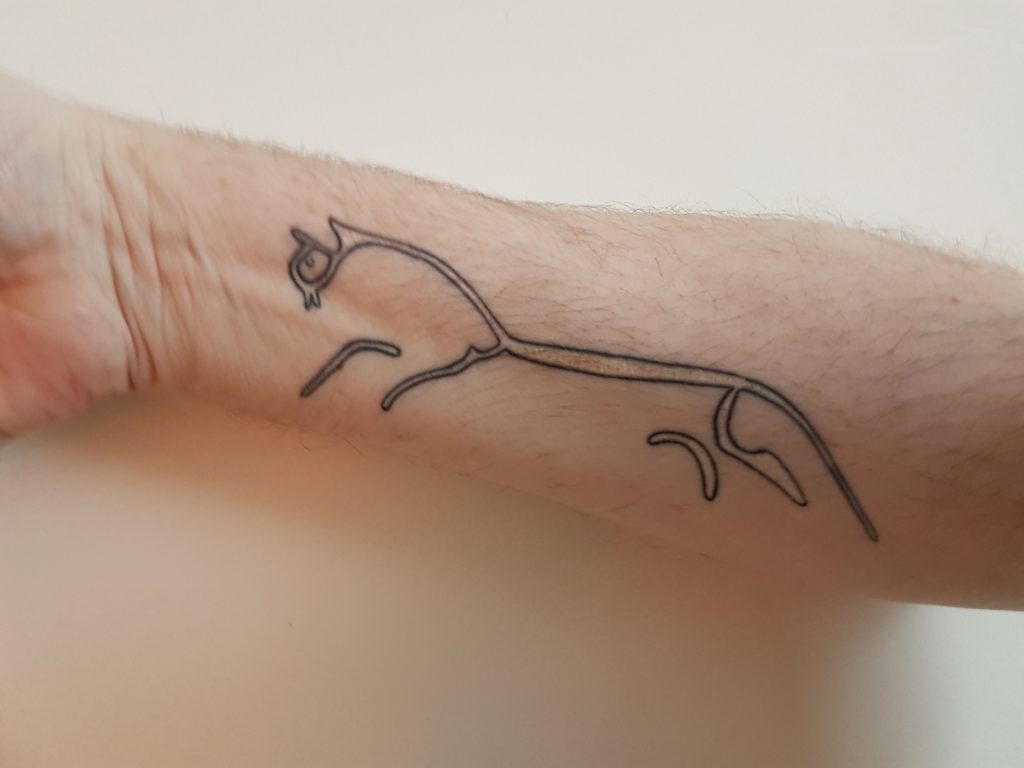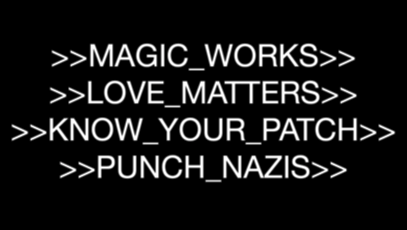Because Jake Stratton-Kent asked me nicely… here’s the text of my talk given at the Cockpit Theatre, London, on 23 February 2020ce, between performances by Andrew O’Neill and Daisy Campbell. I’ve added a few links for context.
TALES FROM THE INTERFACE
After Andrew’s stand up comedy, here’s some sit down thaumaturgy.
The last time I played this room, I helped start a new religion.
On the last night of the Cosmic Trigger play, following John Higgs’s inspiring ‘Pessimism Is For Lightweights’ on the first night of the 2017 London run, I had the honour to perform the closing ritual, where I riffed around a concept from the science fiction writers Spider and Jeanne Robinson

…suggesting that we should become the opposite of terrorists: plotting in public to make people’s lives better. The Robinsons called this Rapturism: Higgs, noting how Google treats the word Rapture, changed it to Wonderism… and that led to the first Journey to Nutopia and brings us back here today.
And today is the sixth anniversary of the first public magical ritual I did for Cosmic Trigger, in Liverpool’s Mathew Street, teaming with John and Daisy and about fifty other people to summon the synchronicity-enhancing powers of C.G. Jung and one of Alan Moore’s greatest creations, John Constantine.
It has been, to put it mildly, an interesting six years. We all know the political and actual heavy weather we are facing… but on a night like this one, I think it’s important to underline something else.
We are living in a truly unprecedented renaissance of magic.
The sheer amount, range and availability of magical information today would shock our ancestors. For a start, we are benefitting from a resurgence of interest in magic and the occult in historical and archaeological academia. The recovery and restoration of ancient documents, such as the Graeco-Egyptian Magical Papyri, one of the oldest spellbook we have, has led to the rise of many highly detailed explorations and modern recontextualisings of these old magicks: for example, there is a resurgence of interest in working with old school grimoires such as the Grimorium Verum, led by writer-practitioners like Jake Stratton-Kent, who balance the texts with a modern, post-chaos-magic sensibility. For those who seek a specific path, from reconstructions of lost religions such as the Kemetic revival of Ancient Egyptian magic to living traditions from the African diaspora such as vodou, you can find detailed instructions, working groups and initiators.
If you’re more inclined to find your own path, chaos magic has never been healthier: the IOT is still going strong, and we have experienced and talented authors drawing on that first wave of chaos magic, such as Gordon White, old hands like Phil Hine and one of my new favourites, Aidan Wachter.

If I was to recommend just one book on magic from the past few years as both an entry to finding your own magic or for resharpening your existing practices, it would be his Six Ways. A term he coins in it, which I have become fond of, is The Field, which he defines as
‘The totality of manifest and unmanifest reality’
…which means both the Tao and the fine array of strangeness and powers that I usually just call Weird Shit.
Western mainstream culture has also become friendlier to the possibilities of magic, partly through the rise of popular fantasy fictions.
From Terry Pratchett to Harry Potter – who doesn’t get a slide because Rowling is a fucking TERF – to the often practitioner-written urban fantasy subgenre, this permits imagining a weirder, wider world that anyone can explore, outside of religious or national hierarchies. As a result, the level of what Genesis P. Orridge called Occulture has been rising since the Sixties and has exploded in the last twenty years or so.
Much of this, of course, is due to modern media and the internet. Not only are these materials available, and usually quite cheaply or even for free, there are countless places where they can be discussed in depth. Magic is becoming simply easier to find… and more people are doing so.
This is, it has to be said, something of a mixed blessing.
More materials, and a sizeable industry to sell them, means that these grains of magical nutrition are usually found somewhere among an awful lot of shite.
Similarly, for every smart, experienced and capable magician talking about what they do, comparing notes with others as equally as they can manage, there’s dozens of far less experienced, half-trained, half-arsed dogmatic people who will happily jump into these conversations with their own agendas, bad research and worse opinions. This ends as well as it usually does.

For example: the Tumblr social media platform has developed a lively community of witches. They draw on a wide range of personal experience and research – and of course personal biases and leftover habits from the beliefs of their families and cultures – striving for ways to make magic work for them in a modern context. A lot of these witches are young women living with their usually very Christian families in American flyover states: they have developed a clever and subtle set of practices which allow them to speak with the gods and powers they feel connected to without tipping off their folks, and they have much to recommend them.
But, of course, they argue. We always do. That’s an inevitability in working with The Field… because magic is, I think, the most subjective pursuit humans have found to date.
This subjectivity makes defining hard and fast rules about How To Do Magic tricksy at best, especially when it comes up against the human need for stability, structure and coherence.
So many gods and spirits, models and metaphors.
So many paths you can explore.
So damn many contradictions.
I’ve been chewing on my own set of these for getting on fifty years, now. The more I do so, the more I try to reconcile all these different approaches, their striking similarities and their warring contradictions, the less inclined I am to say there are any universal Rules Of Magic. Anything I come up with ends up as
“more what you’d call guidelines than actual rules”.

So, that’s what I’m bringing you tonight. A handful of guidelines that have served me well over the years, and one basic, minimalist model to underline them, which tries to navigate a path between and through the possibilities of doing magic in 2020.
The model isn’t very original: it’s basically the result of a working class English lad meeting some no-doubt iffily translated Taoism in his youth and messing about with it ever since. But, for me, it’s one that allows for the widest spread of possible magical paths and realms while avoiding becoming locked into dogma.
I’ve taken to calling it Interface Theory, and it goes like this…
Whenever we encounter something weird in The Field, there is one common factor in all such encounters, which is our minds. Our upbringing, our culture, the things we’ve read and seen and done, create a series of patterns, arrangements of symbols and ideas. Our ‘connectome’…
“a complete description of the neural wiring of an organism”.
Every pattern we have ever seen, hard wired into our neurology.
The structure of our reality tunnels is made from our connectome… and it is the interface by which we try to comprehend the universe. In the physical world, when we encounter events, phenomena, other people, the subjectivity of this gets corrected somewhat. Like the old saying goes: no matter how hard you’re tripping balls, assume that all cars continue to be real.
This does not apply so well when our Interface meets The Field, because we cannot really know what the other side of that Interface is. There’s no possibility of solid, objective confirmation of what we find there… and we can only describe it through the impact it makes upon our connectome.
The Tao of which we can speak is not the Eternal Tao: the Field described is not The Field… because as soon as we open our gobs, we’re at least a little bit wrong, due to the limits of symbol and language. We can try to find common threads between all the different recorded encounters we have of other people describing what happened when their interface met The Field, attempt to triangulate on what the other side of the interface is up to… but we can’t confirm it objectively, and I think it’s a mug’s game to try.
The history of magic is basically a fairly random compilation of the research notes of various people whose interfaces bumped into The Field, by accident or design, filtered through either just their connectome or that of everyone else who’s worked similarly. Observations become habits; habits become dogma. And, there is no way to verify if any of it is true or useful, other than by comparing notes and running the experiments.
This idea of verification is a key one. There’s a phrase in modern occultism some of you may have heard:
‘Unverified personal gnosis’.
First mentioned in print in Kaatryn MacMorgan’s book Wicca 333 but originating in the Norse Asatru communities in the 70s, it means, roughly, an experience with The Field you’ve had that doesn’t precisely match up with an existing system or mythology, or contradicts them. The term is used a lot in pagan circles… usually as a negative. The implication is that somebody has the authority to verify, to approve, what your Interface told you about The Field.
Now, the term has some precautionary value; for example, just because you had a personal gnosis in which, say, Papa Legba told you he really likes muffins doesn’t give you the authority to stroll into a group of initiated Vodou practitioners and insist on buns at the crossroads. That’s both rude and missing the point. But, it does mean that leaving a bun at the crossroads could become part of how you venerate Legba… and maybe, some day, if enough people do it too and find it fits, it could become part of a ‘verified’ personal gnosis.
I found a better pair of terms for me than verified versus unverified personal gnosis in fandom: the idea of Canon and Head-canon.
Canon is, basically, the existing texts. Head-canon is what you think the texts imply or something which you can make a case for from them.
Canon is all the Sherlock Holmes stories by Arthur Conan Doyle: Head-canon is believing Holmes and Watson were lovers.

You can ‘ship Holmes and Watson all you like… it doesn’t change a word of the text, but it’s a valid and popular interpretation of it.
Taking this back to that point of gnosis, of connection via the Interface to The Field: on a personal magical level, your head-canon actually comes first. Something Happens: your connectome tries to interpret the event using its existing kit and you then try to use the result to make similar connections, or try to describe your connection to others.
That’s when the fun starts… because people tend to assume their gnosis-plus-connectome Is Truth, rather than the Interface being partly a mirror, reflecting our own reality tunnels back at us… so they will usually start arguing about which interface is True. Real.
‘Authentic’.
Something I’ve come to believe over the years is that Truth and Authenticity are basically irrelevant to actually doing magic.
A huge chunk of my connectome was taken from being a nerd. I was a science fiction fan before I knew I was a magician, and that stuck. As a result, a shocking amount of my utterly unverified magical gnosis has come from reading or watching fiction rather than grimoires or histories… and one specific insight came to me from a comic book: the sadly unfinished science fiction collaboration between writer Warren Ellis and artist Ivan Rodriguez, DOKTOR SLEEPLESS, in which the protagonist delivers a stirring radio rant whose punchline is…
“Authenticity is bullshit. Never more so than today.”.

Instead, he speaks of being authentic to your own evolving inner self and calls on his listeners to experiment upon themselves, to…
“…become mad scientists. Here, at the end of the world, it’s the only thing worth doing.”
That insight rewrote my connectome. And it soon occurred to me that, though it might be debatable in some areas of life, it seems to be spot on for magic.
Because, frankly, it really looks like magic doesn’t give a fuck if it’s authentic or not.
Magic doesn’t care if you get your Four Corners in a formal ritual round the wrong way, or if you swap out archangels for Star Trek characters, if you use a bone-handled athame or a Swiss Army knife. If it speaks to you and gets your Interface positioned well enough, you’ll get results. Likely a bit different from the purists… but you’ll get something.
Those Laws of Similarity and Contagion some magicians and scholars talk about? Again, more sort of guidelines than rules. Any set of correspondences you make for yourself will always carry more weight for you, and maybe someone else will like the feel, too. But until then, shop bought is of course fine. Magic is always about relationships: the ones that arrive into your life and the ones you choose to nurture.
Here’s a small, silly and yet tenacious example of making a correspondence from my own work:
A few years ago, before I realised quite how buggered my bones were with arthritis, I was at a gig: the Tuareg blues band Tinariwen. Standing room only, my back and knees were killing me and I had no painkillers with me.
What I had was a packet of Polos…

…and an idea from another of my science fiction favourites. In John Varley’s novel The Golden Globe, the protagonist has to quickly stow away on a spaceship with little oxygen. The only way they can survive the trip is if they sleep through it… and they have no sleeping pills. Just a packet of aspirin. So, they settle themselves into the cargo hold, and meditate on the idea that those aspirin were Very Powerful Sedatives. So powerful that they would knock them out for the journey. They took an aspirin – just one, because two would be Too Powerful, and settled in… and fell asleep for the whole journey.
So, I took my packet of Polos and meditated on them as being Very Powerful Analgesics.
I cast a spell that said Polos Are Painkillers, and carefully took one. Just one, because two would be Too Powerful. And the pain eased off.
Ever since then, for me, Polos are a magical painkiller. Pretty sure that’s not on the packet: it’s certainly not a Verified Gnosis.
Magic is one of the few activities where Doing It Wrong works pretty much as well as anything else. After all, who truly has the authority to say what counts as Wrong here?
Tradition, as the saying goes, is just peer pressure from dead people.
Which is not to say you shouldn’t pay some heed to either tradition or what appears to be the dead: both have much to offer. But, simply put – they were then. This is now.
That brings me to consider this: a great deal of what crosses the Interface from The Field seems to act like some kind of sentience: call then gods or demons, angels or aliens. You can split magical theories about this into roughly 3 types:
…the Energy Model (it’s all Ch’i, The Force, in various forms), Spirit Model (there’s spirits, they do stuff, lots of different types – basically, pantheism) or Psychological (it’s all just my Interface talking to different bits of itself, yer basic atheist position).
My own beliefs tend to a combo of Energy and Spirit, with the Psychological staying entirely within my end of the Interface. The reason I stay away from the hard-atheist variant of the Psychological model is based on a lot of experiences where it seemed like something that really isn’t me, or in many cases isn’t even remotely human, has communicated with me in various ways. And, most importantly, treating these encounters as if they are with actual intelligences works really well… and treating them with disdain can go very badly indeed.
Think of it as good manners, if nothing else. Never a smart move to say to a possible friend and ally “I don’t believe you’re real, I think I’m just talking to myself”… especially if said being could cheerfully fuck up your life completely. Even if, perhaps especially if, they are supposed to be a fiction.
Truth be told: one of the longest and most valuable relationships I have had with an intelligence from the Field has been with John Constantine. To me, Conjob is at least as real as any historical or mythological being: always a valued colleague, but never, ever, a friend.
But how those seeming intelligences behave is often clearly influenced by our connectomes, our idea of what such beings should or could be, and there are so many pantheons, some of which overlap but most of which clash. The idea that the Interface mediates comms between us and Them, provides a lingua franca between our minds and The Field, helps me deal with this multiplicity without getting into arguments about which is more Authentic. As Alan Moore notes, ‘the one place we know that gods and spirits certainly exist is in our imaginations‘.
The question is; how much of their nature is imaginal and how much… something else, something reaching across the Interface?
Think of the Interface as a meniscus…

…that thin and paradoxically strong threshold layer between air and water. The meniscus is host to its own separate ecosystem of plants and animals, partaking of both layers, both worlds: but, seen from above, it’s hard to tell which beasties live in the meniscus, which live below it, and which can move between those realms… until they move.
This is a good time to emphasise that what happens across the Interface can never simply be an assemblage of our experiences and biases. The other side can, will and should surprise us… which I am sure Daisy will testify to later.
Here’s an example. One of the best magicians I read on a regular basis is Craig Slee, also known as Mister VI, creator of the blog Cold Albion. Craig started out in chaos magic in the Eighties, like so many of us, and among his workings, he tried, as well as an uninitiated Cornishman can, to go to the crossroads and speak with Papa Legba. He did the work, he waited… and Legba spoke to him.
What Legba said was basically this:
“Hi. Thanks for dropping by, but you’re not one of mine. See that bloke over there…

…floppy hat, one eye, two ravens? You’re one of His.”
Craig became, without planning to do so at all, an Odinsman: a relationship which transformed his life and magic.
I have always liked rephrasing the idea of Order and Chaos as a balance between Structure and Surprise. The Interface is our structure to be with Tao, The Field: we should be ever open to the possibility of Surprise.
Aiden Wachter’s book Six Ways has a couple of different definitions of magic: the one which particularly struck me is this…

After all, what is more surprising than falling in love?
For me, it’s never been about doing magic because I sought power or felt drawn to a specific pantheon, or to be cool – because where and when I started out, it was not cool at all…. It’s far more I just fell head over heels in love with magic as an intrinsic part of my life. Something to be wooed, rather than conquered. To build a relationship with.
I was, in a word, enchanted.
My Interface picked up the habit at a very early age of seeking out strangeness, looking for magic in all the ‘wrong’ places. And, to my delight, I found the wrong places – back alleys, science fiction conventions, cinemas or car parks or sex clubs or bus stops – could be as magical and enriching as any ancient monument. As a result, much of my life has been spent in an act of re-enchantment: of sharing the delightful possibilities of The Field, showing that you don’t need special tools, expensive robes or a precisely constructed magical space… though all those things are nice and can certainly add to your magic.
All you really need for magic is to be open to the possibility of falling in love with the Field. And then, the stories and patterns and symbols you associate with that love become part of your power. A method or ritual you’ve worked with, something that truly calls to your deepest Self and across the Interface to its denizens, becomes as intimate and utterly all-encompassing as singing the song you fell in love to. And, the more you and the Field talk, the more your connectome and Interface shape themselves to fit; like an old married couple who know each other intimately and deeply, that dialogue can be damn near telepathic.
Some places, to be sure, seem to carry more possibility of this than others. That horrible old Victorian term, trotted out every Halloween of ‘a thinning between the Worlds’, does have some truth to it… some times and places just seem thinner, both straddling and encompassing that meniscus. Magic itself can be seen as a threshold state, a quintessential liminality: some thresholds you find, and some you carry with you.
As a result, there is no better advice to a magician than to really get to know your own patch. You have to be fully within your environment, be open to its possibilities, wherever you want to do magic. Start with your immediate neighbourhood: find those odd little corners that feel a little thinner; talk to the local plants and animals and other inhabitants, and perhaps leave them small offerings. Find somewhere that ‘sparks joy’, and make it sacred to you and to anything else that may pass by. Those threshold points are as vital to an ongoing magical practice as breathing, grounding, raising and banishing.
Love them: protect them.
It is that love, that intense passion for something that fits into your soul like a missing jigsaw piece, that I think is the core of doing magic. Rather than the borderline fascist idea of the Pure True Will so beloved of Crowley and his lesser imitators, I think it’s loving the act of magic itself, and all that you connect with it, that provides the impetus for magic to, for want of a better word, work. Empty ritual does nothing, regardless of origin, especially if it doesn’t connect to you other than superficially. The rites and symbols that stir you… they’re the ones the Field takes interest in and responds to. Like any good relationship, it’s about reciprocity.
Typically for me, I only really understood this by falling in love with, and becoming a citizen of, a place that does not physically exist.
Hookland was born from the mind of writer and cunning man David Southwell (shout out if in the house). One time, he was at the BBC and managed to blag a taxi ride home with J.G. Ballard. They talked a lot about writing and Ballard said to Southwell something which changed his life.
“You need to write about place: nothing else is worth a damn.”
A couple of years later Southwell had what can only be described as a download – over a few days, the history, folklore and magic of a lost English county poured from the Field through his Interface and onto the page, and he called it Hookland.
The mythology of the county, rich with a deep retelling of Albion’s folklore, has grown hugely, many folk finding its weird darkness oddly friendly and welcoming, contributing to this open-source mythos – among other things, it’s birthed art, several horror stories, a film plot and even a pair of orchestral suites. Hookland summons a remarkable act of magic: creating a spirit of place for a place with no physical form. A simulacrum of authenticity… but one real enough for people to fall in love with. And I did. Through my relationship with Hookland, I found a personal path into the English Cunning which awoke in me a connection to place I’d never known before. The Ghost Soil – David’s term for the ancestral memory of Albion, under our feet and available to any who sweated or bled into it, no matter where they were once from – opened to me.
As I said: we are living in a great magical renaissance, beyond even that of the 1970s weirdness which helped to birth Hookland. Unfortunately, not everyone involved in it plays well with others.
The 21st Century could, frankly, do without a return of fascism: but, for whatever reason, we are stuck right in the middle of a rise in xenophobic popularism supported by entrenched political and financial might. They take attention; they take money and power. And, they are definitely trying to take magic for themselves, too. Blood and soil for them, instead of a ghost soil for all.
Hookland has taken a very loud stance against this, especially the attempt by various Volkish movements to try and claim British folklore as both intrinsically isolationist and entirely white: a terrible lie to set upon our Mongrel Nation, a theft which lessens us all.
Magic, as I said, doesn’t give a fuck. So it is up to us to do so.
As we like to say in Hookland… Re-Enchantment Is Resistance.
A resistance which builds inclusive and loving communities who can share their Interfaces and compare notes about the Field, which refuses all claims for an absolute Truth, especially one which only takes and burns and never shares.
We can be Wonderists, for more than a day. We can journey to Nutopia, and we can live in Hookland.
About five years ago, I got a message across my Interface from the Field, which seemed to come from the ancient Celtic war-goddess Brigantia. She said to me:
“A cold, harsh wind is coming. Look to the borders.”
This prophecy is the reason I got the White Horse of Uffington tattooed on my arm on Referendum Day…

…a piece of Old Albion in my flesh and blood. And it’s why much of my last few years, when I’ve not been doing Discordian magic with this lot, has been spent on a series of anti-fascist, specifically anti-Brexit curses working with the band The Indelicates, based around their Juniverbrecher album, which reveals Mister Punch, Jimmy Savile and Boris Johnson as avatars of Albion’s dark heart. We tried to banish Mister Punch as best we could, in 3 rituals culminating in our Hexit working of last Halloween.
We could not stop Brexit. But, I think you’ll agree, it’s cursed to shit.
That cold harsh wind is blowing now, literally and otherwise. And rather than making our borders harder and more exclusive, we need to open them – across nations and between ourselves and across the Interface deep into the Field.
To make all of our borders semi-permeable membranes like the wall of a cell, allowing nutrition and information to pass through as it needs to.
For a cell which shuts off its borders completely is destined to die, and I’ll be fucked if I’ll let that happen to my home.
That’s my time done, so let me just quickly sum up.

The Christian fundies holler for ‘revival’. Here, in these words, is a Magical Revival of my own. I am going to read this again, take it to heart, and let it lead me back to that state of love. Back to the Field.
Thank you, Cat.
Thank *you* my dear friend! See you in the Field.